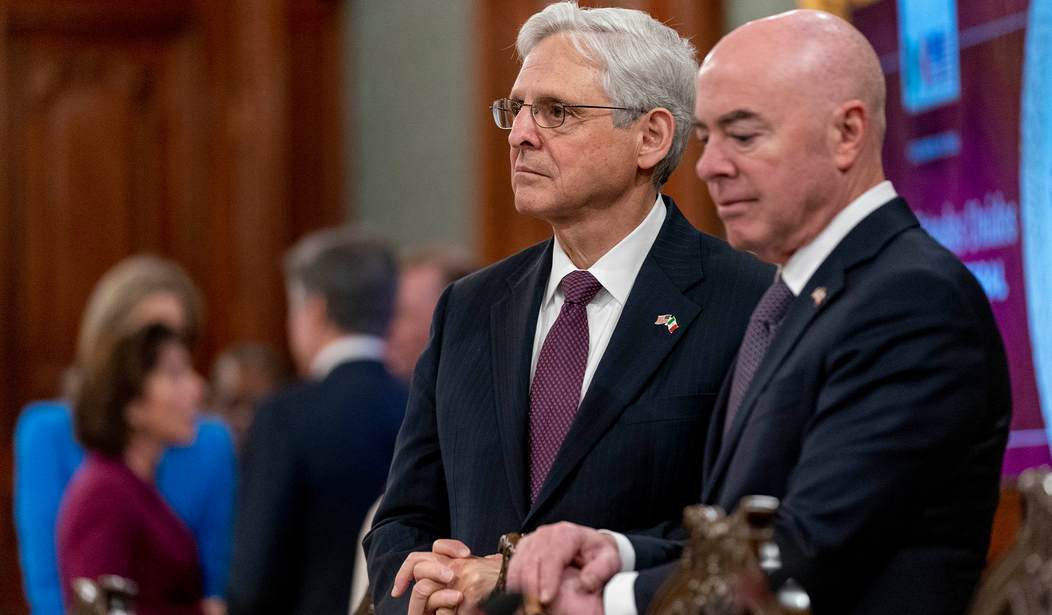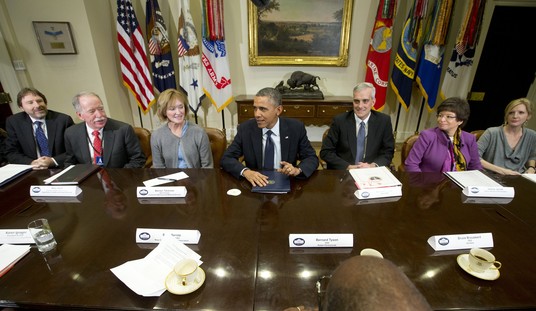Can Judge Terry Doughty enforce his injunction against three pages of defendants in the executive branch to end the Government/Big Tech censorship regime? This question arose almost immediately in the aftermath of his ruling, and the answer is yes … theoretically, anyway.
In practice? Weeeeelllllll … that’s going to get complicated, even apart from the famous (and perhaps apocryphal) Stalin question, How many divisions has the Pope?
First, however, we can expect an immediate appeal and an application for a stay (although it may not yet be appealable, as it is currently a preliminary order, John Hinderaker points out). Doughty’s order makes it pretty clear that he won’t be inclined toward allowing a stay pending an appeal, so the three pages of enjoined entities will have to take their chances at the Fifth Circuit. That venue has not proven very friendly for the government, especially of late. Either way, though, it will go to the Supreme Court, and that might take place in weeks on the so-called emergency docket. And that venue doesn’t look much friendlier to the defendants than the Fifth Circuit, and might be even more broadly unfavorable on this issue than others.
Let’s assume the injunction remains in place until the trial, as Doughty ordered yesterday. The normal process for such enforcement would usually consist of plaintiffs discovering violations and bring those to the court. The court would then issue contempt citations of either a civil or criminal nature, and rely on the Department of Justice to assist in enforcement of criminal citations. That brings us to our first potential problem with enforcement, because look who’s on the list of defendants enjoined in this case:
THE UNITED STATES DEPARTMENT OF JUSTICE, along with their secretary, director, administrators, and employees;
Gee, does anyone see a problem here? What could go wrong? [See update below, but above the podcast embed.]
This assumes a frontal repudiation of the order, and that those get exposed at some point before trial. How likely is that, though? That would be risky both politically and legally, and very much the latter for the individuals involved. This case could drag on for years — and in fact is likely to do so — which means that control of the DoJ and other agencies listed as defendants in this order could change hands before adjudication. Records of defiance and violations could then be made public and presented in court with a DoJ much more willing to assist in the enforcement of criminal contempt citations.
The bigger risk is that the Big Brother censorship regime simply becomes more covert. Doughty ordered that the following conduct cease immediately by all entities he listed in the injunction, as well as “their their agents, officers, employees, and contractors from acting in concert with others who are engaged in said conduct”:
(1) meeting with social-media companies for the purpose of urging, encouraging, pressuring, or inducing in any manner the removal, deletion, suppression, or reduction of content containing protected free speech posted on social-media platforms; 3
(2) specifically flagging content or posts on social-media platforms and/or forwarding such to social-media companies urging, encouraging, pressuring, or inducing in any manner for removal, deletion, suppression, or reduction of content containing protected free speech;
(3) urging, encouraging, pressuring, or inducing in any manner social-media companies to change their guidelines for removing, deleting, suppressing, or reducing content containing protected free speech;
(4) emailing, calling, sending letters, texting, or engaging in any communication of any kind with social-media companies urging, encouraging, pressuring, or inducing in any manner for removal, deletion, suppression, or reduction of content containing protected free speech;
(5) collaborating, coordinating, partnering, switchboarding, and/or jointly working with the Election Integrity Partnership, the Virality Project, the Stanford Internet Observatory, or any like project or group for the purpose of urging, encouraging, pressuring, or inducing in any manner removal, deletion, suppression, or reduction of content posted with social-media companies containing protected free speech;
(6) threatening, pressuring, or coercing social-media companies in any manner to remove, delete, suppress, or reduce posted content of postings containing protected free speech;
(7) taking any action such as urging, encouraging, pressuring, or inducing in any manner social-media companies to remove, delete, suppress, or reduce posted content protected by the Free Speech Clause of the First Amendment to the United States Constitution;
(8) following up with social-media companies to determine whether the social-media companies removed, deleted, suppressed, or reduced previous social-media postings containing protected free speech;
(9) requesting content reports from social-media companies detailing actions taken to remove, delete, suppress, or reduce content containing protected free speech; and
(10) notifying social-media companies to Be on The Lookout (“BOLO”) for postings containing protected free speech.
That is a comprehensive disconnect from the social-media platforms across the executive branch, no? Er, not quite. Doughty recognized that law enforcement and counter-intelligence agencies do have some legitimate reasons for contacting these platforms and carved out exceptions on that limited basis:
IT IS FURTHER ORDERED that the following actions are NOT prohibited by this Preliminary Injunction:
(1) informing social-media companies of postings involving criminal activity or criminal conspiracies;
(2) contacting and/or notifying social-media companies of national security threats, extortion, or other threats posted on its platform;
(3) contacting and/or notifying social-media companies about criminal efforts to suppress voting, to provide illegal campaign contributions, of cyber-attacks against election infrastructure, or foreign attempts to influence elections;
(4) informing social-media companies of threats that threaten the public safety or security of the United States;
(5) exercising permissible public government speech promoting government policies or views on matters of public concern;
(6) informing social-media companies of postings intending to mislead voters about voting requirements and procedures;
(7) informing or communicating with social-media companies in an effort to detect, prevent, or mitigate malicious cyber activity;
(8) communicating with social-media companies about deleting, removing, suppressing, or reducing posts on social-media platforms that are not protected free speech by the Free Speech Clause in the First Amendment to the United States Constitution.
These are unavoidable exceptions, given federal authority on both law enforcement and counter-intelligence. At least they lock out most of the malefactors in the Big Brother regime: the CDC, HHS, the White House itself, Homeland Security, and the State Department. However, even though the DoJ and FBI are defendants enjoined by the order generally, they are the principal agencies involved in all of these exceptions. That means the lines of communication remain open between the censors and the platforms on which they have suppressed dissent and criticism of this administration and their own agencies. It is not difficult to believe that these agencies might use these channels that Doughty has left open to continue to ply their censorship demands and suppression of critics and opponents.
And who would stop them? Doughty could, theoretically, if evidence of such shadow violations emerge. But that might take a whistleblower to step forward, or for Musk-like figure to take over Meta/Facebook or Alphabet/Google and expose documentary evidence of such.
One has to wonder how long it might take before either Congress or Doughty gets pressed into an appointment of a special master to oversee these exceptions to the injunction and the authority to enforce its terms. An independent Inspector General might be enough in the short run, as long as that position came with authority separate from Attorney General Merrick Garland or any of the other defendant entities in this case. Doughty might be sorely tempted to make such a move, especially if he gets indication of violations.
For now, though, don’t get too cynical about the limitations of this process. It’s enough that Doughty has shined a bright light on the darkness of this Big Brother project. The roaches that infest it will have to scurry into the shadows because of it. That is a huge win for the Constitution, for free speech, and for those who got caught and ground up in the wheels of this un-American censorship regime.
Update: A reader on Twitter points out that judges have pretty broad authority to impose sanctions for contempt, but Gabriel Malor is skeptical that Doughty’s order will hold up in that regard:
But only where they've received "actual notice." This obviously defective PI order applies to hundreds of thousands of people, including gov't contractors, who very likely will have never heard about this order before they violate it.
— Gabriel Malor (@gabrielmalor) July 5, 2023
It would violate the terms of this PI for a janitor at the RFK building to complain about a harassing Facebook comment on her private Facebook page, for example. Or for a security guard in L.A. to turn on the spam filter for his Instagram posts. It's obviously overbroad.
— Gabriel Malor (@gabrielmalor) July 5, 2023
The bolded agencies and names on Doughty’s list might be at risk, but Gabriel makes a good point about the breadth of those this order covers. And even if he could, though, who will enforce the terms of the contempt penalty? I’m not sure that this is practical in that sense, although I also think that all sides will have some reason to show more restraint in the weeks and months ahead.
Also, the latest episode of The Ed Morrissey Show podcast is now up! Today’s show features:
- Does anyone in media actually bother to read Supreme Court opinions? Andrew Malcolm and I review all the ways in which media reported inaccurately and sometimes flat-out falsely on the final decisions of the court’s term.
- . We also credit the New York Times for its largely accurate report on a “landmark study” on transgenderism from Denmark.
- What happened in the Wagner Revolt? And what is happening with Twitter, too?
The Ed Morrissey Show is now a fully downloadable and streamable show at Spotify, Apple Podcasts, the TEMS Podcast YouTube channel, and on Rumble and our own in-house portal at the #TEMS page!








Join the conversation as a VIP Member